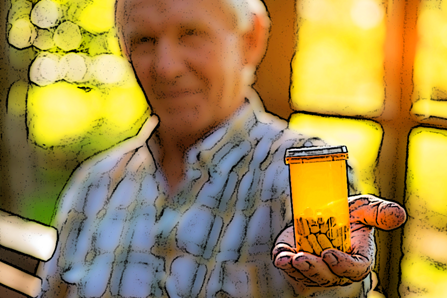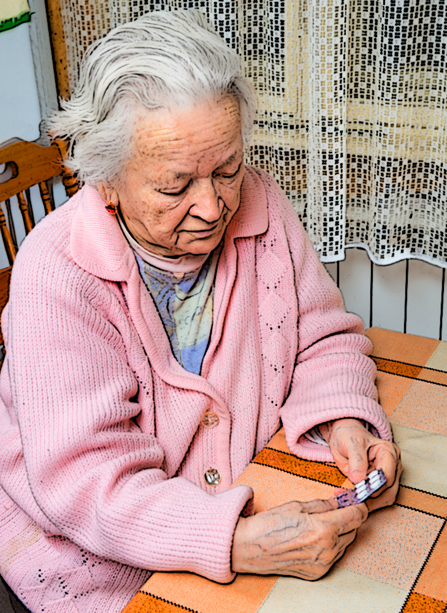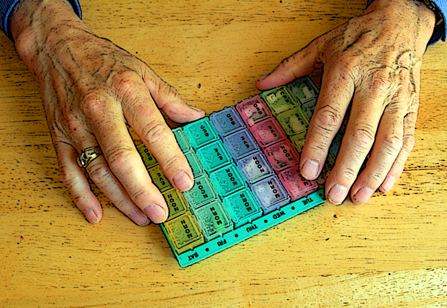Loading Our Senior Citizens Up with Pills…That May End Up on the Illicit Market
If you look closely, there are plenty of signs that senior citizens may simply be loaded up with pills rather than receiving the right care to heal their injuries or ailments. In some cases, this has put so many pills in the hands of the elderly that they take to selling them just to make ends meet. They may find drug users in their neighborhoods or come in contact with drug dealers who will take their extra pills off their hands. Dealers come to rely on these drug deliveries to get supplies for their customers and keep schedules showing which seniors get their drugs on which day so they can stop by and make a purchase.
Naturally, some of these seniors get themselves arrested and go to jail. Others wind up under house arrest or on probation, perhaps those too ill or infirm to survive a jail term.
In the majority of cases, these seniors are not lifelong criminals. Not able to make ends meet, the opportunity to make a few hundred dollars extra each month is simply too tempting to resist.

Let’s look at some of the data we’ve collected that shows how serious and extensive this problem really is.
Why Do Older People Have So Many Pills on Hand?
According to one report, older people may be more susceptible to misuse of prescription drugs because they are prescribed them at a rate three three times that of the general population. They also tend to be in more pain than younger patients and may self-medicate with painkillers they already have on hand. Anti-anxiety drugs and insomnia medications also tend to be misused. All three of these types of drugs are addictive for the person that relies on them too frequently.
A report from the American College of Preventative Medicine (ACPM) sheds further light on the reason the elderly have so many pills in their homes. While the elderly make up only 13% of the American population, the ACPM reports, they receive one-third of all prescribed medications. Here’s an excerpt from a report from the ACPM:
“They tend to have more chronic, long-term pain issues, tend to use multiple medications and may be experiencing waning cognition, making them susceptible to unintentional misuse or abuse. Chronic pain is by far the most common reason for nonmedical use of prescription pain medications later in life.” (Using a drug nonmedically means a person uses it in a way not directed by the doctor, perhaps for a different condition or at a different dosage or more frequently.)
If they are Medicaid patients, the chance of their being drugged with addictive opioids is higher than the general population’s. Patients with Medicaid insurance were found to be far more likely to receive a prescription for an opioid than a person with commercial insurance. One study revealed that 73% of Medicaid patients received an opioid compared to 43% of commercially-insured patients. (Medicaid covers Americans over 65 and also those with low incomes.)

Senior Citizens All Over the Country Reselling Their Drugs
Once they have all these pills in their hands, many are selling them on the illicit market by offering them to drug dealers or selling them directly to users.
From National Public Radio, a Florida father trying to help his son recover from addiction commented on how older people were a big source of prescription drugs on the illicit market:
“When he goes straight and we talk a lot, trying to get him straight, his main sources—he tells me a lot of senior citizens are getting prescriptions. They’re supporting themselves off it because people you would never expect to be drug dealers are, you know, 60, 50 years old getting prescriptions because they don’t have a good pension, and they’re supporting themselves by reselling their pills. Also, a great deal of the pills he was purchasing were coming from guys who were getting them from the VA.”
Confirmation came from a Kentucky news report which noted that the state’s anti-drug task force had charged more than forty people aged 60 or older with selling primarily prescription drugs in the Appalachians.
In Virginia in 2013, four veterans in their 50s pleaded guilty to selling the drugs they had received from the Veterans Administration. The four men had been reselling oxycodone, buprenorphine or clonazepam, a drug treating anxiety and panic attacks.
Medicare Abuses
Despite many safeguards intended to prevent individuals from obtaining harmful amounts of drugs, an analysis of prescriptions provided to Medicare recipients found that about 170,000 Medicare beneficiaries had been to five or more medical practitioners and had received prescriptions for fourteen kinds of drugs that are commonly abused. These drugs included powerful prescription painkillers like oxycodone and hydrocodone products—drugs that are easy for any dealer to sell. The single most popular painkiller for diversion from legitimate use is hydrocodone, found in Vicodin, Lortab and other pills.
Delaware Research Project
In Delaware, researchers recruited police, regulatory officials and criminals brokering or selling prescription drugs on the street for focus groups. The purpose was to gain an understanding of the exact mechanisms of diversion from legitimate use. The result of the project’s discussions was rich insight into the way pills made their way from the elderly to the addicted.
Here are a few excerpts from the final report from this project:
“A consistent theme among the focus group participants was that many members of the elderly population in Wilmington were in the business of deceiving their physicians—because they could complain of pain (whether they were in pain or not) and get prescriptions they wanted. Some of these elderly individuals were reportedly abusing their drugs, but the overwhelming majority were diverting their medications for economic reasons. Some sold their prescriptions on their own initiative, while others would work in conjunction with a dealer or pill broker.”
One female prescription drug abuser in her early thirties explained:
“In my neighborhood we have a lot of old people who get these pills prescribed. They get methadone prescribed, they get needles and all that, and that’s how they make their money. I have twenty different old people that I can go to [to get prescription opioids].”
A young man who was abusing multiple drugs said this about the elderly selling their pills:
“They have a lot of 80 milligram Oxys [OxyContins]. Everybody got the big green pills, and everybody had Xanax. There were old people that were, especially this lady, that was doing like five or six doctors and getting all kinds of prescription pills. They were just giving them to her. She was just selling them.”
Another drug user explained how he got his pills from senior citizens:
“I’ve seen a lot of older people who don’t have a lot of money get addicted to getting the money from the pills that they sell and they’ll go from doctor to doctor, shopping for pills to sell to people.”
Drug Dealers Preying on the Elderly
The Ohio Substance Abuse Monitoring Network reported on the way some drug dealers were targeting the elderly to buy some of their pills for distribution on the black market. The network’s investigation found that drug dealers would stand outside drugstores and wait for the elderly to come out with their pills. They’d then approach the senior citizen and offer to buy the pills or convince them to go to a doctor and fake pain to get a prescription. If the senior citizen would agree, the dealer would drive them to the doctor for the prescription and to the pharmacy for the pills, then take them off the senior citizen’s hands. Sadly, the report concluded, “That’s the only way they can make ends meet.”
The report from the Delaware focus group project had a similar observation:
“Pill brokers develop name, address, and medication lists of individuals who they know are willing to sell their medications. They also maintain a roll of elderly individuals who are willing to deceive their physicians, have their prescriptions filled by certain local pharmacists, and then sell their pills back to brokers at only a small percentage of their street value.”
Resolving the Problem
From these reports, this appears to be a widespread problem that is not yet getting the attention it deserves. The drugs being resold by senior citizens are addictive and can be deadly in the right dosages or combinations.
No one would want their elderly mother or father misusing their own prescriptions or involved in selling drugs to drug dealers. In some states, this activity will land them in jail. In any state, it can lead to legal complications, costs and probation.
Some solutions can be best implemented at the state and local level.
- More complete electronic monitoring of prescriptions, even across state lines, is needed to prevent multiple prescriptions to the same patients.
- Far more training of doctors should be done so they can better identify those seeking drugs to misuse and know how to help patients who are dependent or addicted.
- Seniors who have become dependent on the pills they have been misusing will need help being weaned gradually off those drugs and eased into a healthier, more pain-free lifestyles. At the moment, the vast majority of doctors are not trained as addiction specialists. Given the extensive problem with painkiller abuse in this country, more doctors need to be trained in this specialty.
If you have an elderly parent:
- Monitor their drug use.
- Know what each medication they are taking does and if it is addictive.
- Count their pills periodically to make sure they are not disappearing too soon.
- See if they have the same prescription from more than one doctor (a tell-tale sign of either dependence or acquiring drugs to sell).

- If their alertness is declining, help them by putting their pills in boxes marked by the day.
Even seniors can benefit from drug rehabilitation. At Narconon Arrowhead, we have helped those in their 70s recover from addiction so we are 100% certain that can be done. If you need this kind of help for yourself or a parent or other senior citizen you care about, call us today: 1-800-469-6933.
Quotes/excerpts were minimally edited for length.


